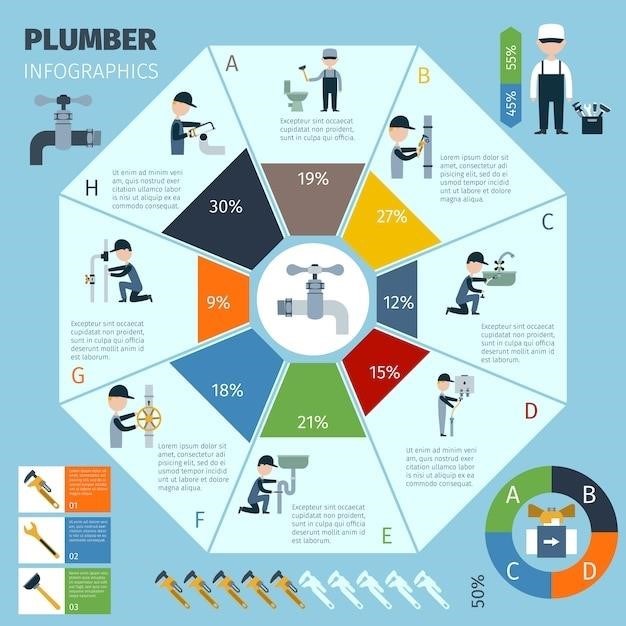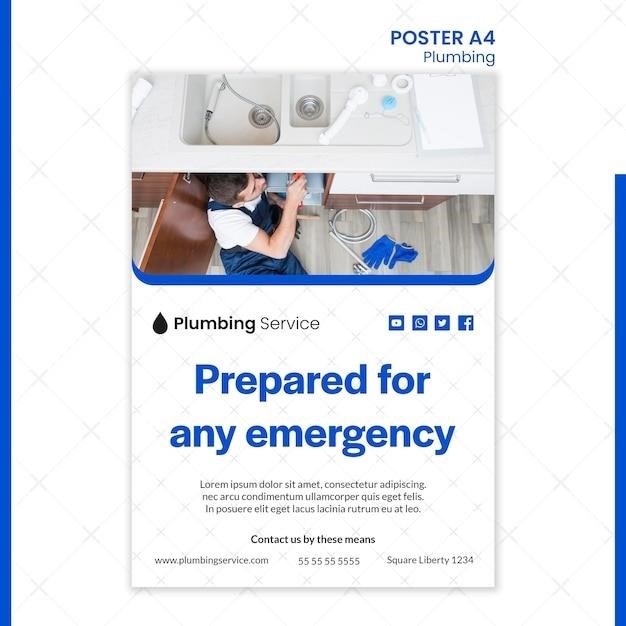International Plumbing Code (IPC)
The International Plumbing Code (IPC) is a comprehensive model plumbing code that sets minimum regulations for plumbing systems and components. It is designed to protect the life, health, and safety of building occupants and the public.
Overview
The International Plumbing Code (IPC) is a model code that provides minimum requirements for plumbing systems in buildings and structures. It’s a comprehensive document encompassing everything from design and installation to the quality of materials used and the maintenance of plumbing systems. The IPC’s purpose is to ensure public health and safety by setting standards for sanitation, water conservation, and the safe use of plumbing equipment. The IPC is a widely adopted code used by many jurisdictions around the world, serving as a foundation for local plumbing regulations.
Purpose and Scope
The International Plumbing Code (IPC) aims to establish minimum standards for plumbing systems to safeguard public health, safety, and property. It covers the design, construction, installation, operation, and maintenance of all plumbing systems, including water supply, drainage, venting, and waste disposal. The IPC applies to both new construction and renovations, ensuring that all plumbing systems meet the necessary safety and performance requirements. It also promotes the use of new and innovative products, materials, and systems while adhering to the fundamental principles of plumbing safety.
Key Features of the IPC
The IPC incorporates various key features to ensure comprehensive and effective plumbing regulations. It utilizes both prescriptive and performance-related provisions, offering flexibility in design and installation while maintaining safety standards. The code emphasizes water conservation by promoting efficient fixtures and appliances, reducing water usage. The IPC also promotes accessibility by including provisions for people with disabilities, ensuring that plumbing systems are usable and safe for all. Furthermore, it includes provisions for the use of new and innovative materials and systems, encouraging technological advancements in the plumbing industry.
History and Development of the IPC
The International Plumbing Code (IPC) has evolved over time to address changing needs and advancements in plumbing technology. Developed by the International Code Council (ICC), the IPC has undergone numerous revisions and updates. The code’s origins can be traced back to the early 20th century, when the need for standardized plumbing regulations became increasingly apparent. Since its inception, the IPC has been revised regularly to incorporate new research, industry best practices, and technological innovations. These updates ensure that the code remains relevant and effective in safeguarding public health and safety.
Relationship with Other International Codes
The International Plumbing Code (IPC) is part of a larger family of model codes developed by the International Code Council (ICC). These codes work together to establish comprehensive building and safety standards. The IPC is closely related to other ICC codes such as the International Building Code (IBC), the International Fuel Gas Code (IFGC), and the International Existing Building Code (IEBC). The IPC is designed to be compatible with these other codes, ensuring a consistent and coordinated approach to building design and construction. This integration facilitates streamlined processes and promotes a unified framework for safety and compliance.
Using the IPC
The IPC provides a framework for plumbing system design, installation, and maintenance, ensuring compliance with safety and health standards.
Accessing the IPC
The International Plumbing Code (IPC) is readily accessible in PDF format through various online platforms and resources. The International Code Council (ICC), the organization responsible for developing and publishing the IPC, provides access to the code on their official website. Additionally, many other websites, including those of plumbing supply companies, building code websites, and online bookstores, offer downloadable PDF versions of the IPC. These resources ensure that professionals and individuals have convenient access to the latest edition of the IPC for reference and application.
Interpreting and Applying the Code
The IPC is a complex document that requires careful interpretation and application. Understanding the code’s intent and the underlying principles is crucial for successful implementation. It’s essential to consider the specific context of the project, including the building type, location, and intended use. Additionally, the IPC provides both prescriptive and performance-related provisions, allowing for flexibility in design and material selection while adhering to safety and health standards. Consult with qualified professionals, such as licensed plumbers, engineers, and building code officials, for guidance and assistance in interpreting and applying the IPC to specific projects.
Compliance and Enforcement
Compliance with the IPC is essential for ensuring safe and functional plumbing systems. Building officials and other authorities enforce the code through inspections at various stages of construction and renovation. The IPC outlines specific requirements for materials, installation methods, and testing procedures. Failure to comply with the code can result in fines, delays, or even the need for corrective actions. It’s crucial for contractors, designers, and property owners to understand the code’s requirements and work closely with building officials to ensure compliance throughout the project. Regular maintenance and inspections of plumbing systems are also important for long-term safety and performance.
Updates and Amendments
The IPC is a living document that is regularly updated to reflect advancements in plumbing technology, materials, and best practices. The International Code Council (ICC) publishes new editions of the IPC every three years, incorporating changes based on research, industry feedback, and evolving safety standards. These updates may address new materials, installation techniques, energy efficiency requirements, or changes in building codes. It’s crucial to stay informed about the latest edition of the IPC and any amendments that may be applicable to your projects. This ensures that plumbing systems are designed, installed, and maintained to the highest standards of safety, efficiency, and sustainability.

Benefits of Using the IPC
The IPC offers numerous benefits, including improved safety, health, sustainability, and economic advantages for building projects.
Safety and Health
The IPC prioritizes safety and health by establishing regulations for plumbing systems that prevent the spread of disease, ensure safe water supply, and protect occupants from hazards like leaks, backflow, and gas leaks. It covers aspects like water quality, waste disposal, ventilation, and the use of safe materials, contributing to a healthier and safer environment for building users.
Sustainability and Water Conservation
The IPC promotes sustainable practices by encouraging water-efficient plumbing fixtures and systems. It includes provisions for low-flow toilets, showerheads, and faucets, reducing water consumption and minimizing strain on water resources. The code also addresses water conservation techniques like rainwater harvesting and greywater reuse, contributing to a more sustainable and environmentally conscious approach to plumbing.
Innovation and Technology
The IPC embraces technological advancements in the plumbing industry. It allows for the use of new materials, innovative plumbing designs, and cutting-edge technologies. The code encourages the use of water-saving fixtures, energy-efficient appliances, and advanced plumbing systems, promoting both sustainability and technological progress within the plumbing sector. This forward-thinking approach ensures that the IPC remains relevant and adaptable to the ever-evolving landscape of plumbing technology.
Economic Impact
The IPC plays a vital role in shaping the economic landscape of the plumbing industry. By promoting safe and efficient plumbing practices, it fosters a robust and reliable infrastructure, contributing to economic growth. The consistent use of the IPC across various jurisdictions creates a standardized approach to plumbing, promoting fair competition and reducing costs associated with project delays and re-work. This economic stability attracts investment in the industry, ultimately leading to job creation and overall economic prosperity.

Resources and Support
The International Code Council (ICC) is a leading resource for the IPC, providing access to the code, training, and certification programs.
International Code Council (ICC)
The International Code Council (ICC) is the primary developer and publisher of the International Plumbing Code (IPC). The ICC is a non-profit organization dedicated to developing model codes and standards for building safety, sustainability, and affordability. Through its website, the ICC offers access to the latest version of the IPC, as well as other resources such as training materials, certification programs, and technical support. The ICC also provides a platform for industry professionals to collaborate and share knowledge on plumbing codes and regulations.
Other Organizations and Resources
Beyond the ICC, various other organizations and resources contribute to the understanding and application of the International Plumbing Code (IPC). These include the International Association of Plumbing and Mechanical Officials (IAPMO), which develops and promotes plumbing and mechanical codes and standards, including the Uniform Plumbing Code (UPC). The World Plumbing Council (WPC) serves as an international platform for plumbing professionals, advocating for the industry and promoting best practices. Additionally, online platforms like ICC Digital Codes offer comprehensive resources, including the IPC, for professionals and the public.
Training and Certification
Proper understanding and application of the IPC are crucial for ensuring safe and compliant plumbing installations. The International Code Council (ICC) offers a range of training programs and certification opportunities for professionals working with the IPC. These programs cover various aspects of the code, including installation techniques, code interpretation, and best practices. Obtaining certification demonstrates a professional’s knowledge and competency, enhancing their credibility and marketability. Furthermore, many jurisdictions require plumbing professionals to hold specific certifications to work on plumbing projects, ensuring compliance with the IPC and maintaining public safety.



